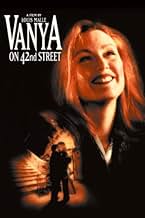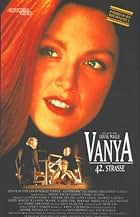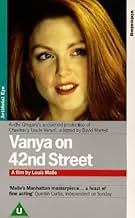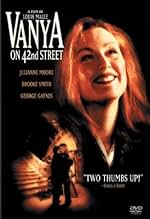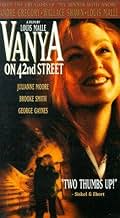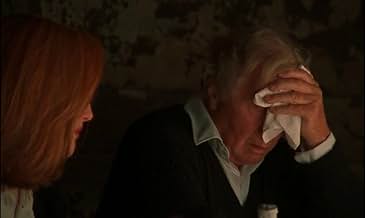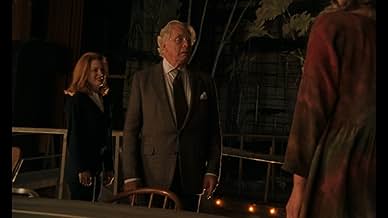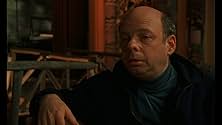AVALIAÇÃO DA IMDb
7,3/10
5,5 mil
SUA AVALIAÇÃO
Atores de Nova Iorque ensaiam "Uncle Vanya" de Chekhov num teatro em ruínas.Atores de Nova Iorque ensaiam "Uncle Vanya" de Chekhov num teatro em ruínas.Atores de Nova Iorque ensaiam "Uncle Vanya" de Chekhov num teatro em ruínas.
- Direção
- Roteiristas
- Artistas
- Prêmios
- 3 vitórias e 13 indicações no total
- Direção
- Roteiristas
- Elenco e equipe completos
- Produção, bilheteria e muito mais no IMDbPro
Avaliações em destaque
There's no shortage of intelligent work in film. But here we have one of the most complexly referential things I've ever seen. Simple self-reference points to itself. Common self-reference points to the viewer defining the experience.
But Mingus used to say why have three threads when you can have seven? Here, some of the most adventurous thinkers in film give us four threads, actually four and a half.
We have the Chekhov play and the Mamet wrapping. Make no mistake that this is not an editing or a translation, but an annotation. We have two perspectives simultaneously. Add to that the notion of the play not as a play for an audience as intended, but an event conducted regularly by the performers for their own sake. This is a creation orchestrated by Gregory, the third thread. One can clearly see in some scenes neither Chekhov nor Mamet but artists collaborating in dialogs. The inner eyes and the outer eyes differ.
Fourth, we have Malle's creation which introduces us into the equation with deliberately shaky and sometimes misframed camerawork. We aren't part of any prior experience, but the actors do include the camera in their collaboration, as an independent thread. Watch how Andre works the camera.
And finally, we have the framing of the artists in real life. This is not simultaneous with the others and in any case excludes the filmmaker.
I recall seeing Paul Newman in the Color of Money in the first scene, acting on three levels simultaneously. It took my breath away. Here, the purpose of the whole contrivance is to challenge the actors (and the viewers!) to participate in a jazz ensemble of acting where the layer of reality is constantly shifting. They chose Uncle Vanya as the base for a reason, because his evershifting foci of love and hate in pairs provide cues for levelshifting.
Shawn really plays on this. His skill wasn't apparent to me on first viewing, especially in the first scenes, where all players are on stage and the non-focus actors have to be invisible. But on repeated viewings one can see his mastery, his shifting forehead! Maybe he could have been a Dostoyevsky. The two young women should be celebrated to the heavens for what they do together. I never believed so many giggles and gasps and stutters and excited silences could be so finely woven, tossed so lightly.
This is really, really good stuff, very smart. So far as an intelligent construction you won't see a superior. I never expect to see four levels at once again in film at least centered in the acting.
But Mingus used to say why have three threads when you can have seven? Here, some of the most adventurous thinkers in film give us four threads, actually four and a half.
We have the Chekhov play and the Mamet wrapping. Make no mistake that this is not an editing or a translation, but an annotation. We have two perspectives simultaneously. Add to that the notion of the play not as a play for an audience as intended, but an event conducted regularly by the performers for their own sake. This is a creation orchestrated by Gregory, the third thread. One can clearly see in some scenes neither Chekhov nor Mamet but artists collaborating in dialogs. The inner eyes and the outer eyes differ.
Fourth, we have Malle's creation which introduces us into the equation with deliberately shaky and sometimes misframed camerawork. We aren't part of any prior experience, but the actors do include the camera in their collaboration, as an independent thread. Watch how Andre works the camera.
And finally, we have the framing of the artists in real life. This is not simultaneous with the others and in any case excludes the filmmaker.
I recall seeing Paul Newman in the Color of Money in the first scene, acting on three levels simultaneously. It took my breath away. Here, the purpose of the whole contrivance is to challenge the actors (and the viewers!) to participate in a jazz ensemble of acting where the layer of reality is constantly shifting. They chose Uncle Vanya as the base for a reason, because his evershifting foci of love and hate in pairs provide cues for levelshifting.
Shawn really plays on this. His skill wasn't apparent to me on first viewing, especially in the first scenes, where all players are on stage and the non-focus actors have to be invisible. But on repeated viewings one can see his mastery, his shifting forehead! Maybe he could have been a Dostoyevsky. The two young women should be celebrated to the heavens for what they do together. I never believed so many giggles and gasps and stutters and excited silences could be so finely woven, tossed so lightly.
This is really, really good stuff, very smart. So far as an intelligent construction you won't see a superior. I never expect to see four levels at once again in film at least centered in the acting.
Malle's adaptation handles Tchekhov's notoriously difficult shifts in mood and context excellently, investing every scene and almost every word with an edge of ambivalence and frustration, and the performances are all first-rate. Moore in particular, from her first appearance in the film (which is without dialogue) to the final scene constructs a really intelligent performance as Yeliena, I feel, and she seems to cover the whole gamut of Yeliena's character from the giggly and superficial to the introspective.
With all due respect to the American school this film could have descended easily into overwrought Tennessee Williams-esque Naturalism with lots of method-style spitting and uncomfortable truth. Instead the intellectual, spiritual dimensions of Tchekhov's play are always brought to the fore, in addition of course to Tchekhov's dark brand of humour, where the actors (particularly Julianne Moore) laugh through their tears and visa versa. Avoiding the common temptation of drawing out the play's anguished characters at a snail's pace, Malle also paces the film well, with an emphasis on lightness and subtlety of delivery - the result is both intellectually and emotionally satisfying.
With all due respect to the American school this film could have descended easily into overwrought Tennessee Williams-esque Naturalism with lots of method-style spitting and uncomfortable truth. Instead the intellectual, spiritual dimensions of Tchekhov's play are always brought to the fore, in addition of course to Tchekhov's dark brand of humour, where the actors (particularly Julianne Moore) laugh through their tears and visa versa. Avoiding the common temptation of drawing out the play's anguished characters at a snail's pace, Malle also paces the film well, with an emphasis on lightness and subtlety of delivery - the result is both intellectually and emotionally satisfying.
The idea of filming a play gets turned upside down as we see the players before and after the (rehearsal) performance, essentially as themselves. One remarkable scene shows the cast during intermission chatting with each other and audience members while munching on goodies from a caterer. It gives the experience of watching a play in an old, run-down theater, including comments from the director.
The play itself is no less remarkable. Shawn is a gifted actor, one of the few who can bring his entire body into a role. The rehearsal atmosphere takes some getting used to - it's hard to tell when real life ends and the play starts. There are no costumes, little in the way of sets, but it all works because the performances are so compelling. And Chekhov's Uncle Vanya is surprisingly relevant 100 years after it was written.
The play itself is no less remarkable. Shawn is a gifted actor, one of the few who can bring his entire body into a role. The rehearsal atmosphere takes some getting used to - it's hard to tell when real life ends and the play starts. There are no costumes, little in the way of sets, but it all works because the performances are so compelling. And Chekhov's Uncle Vanya is surprisingly relevant 100 years after it was written.
10Jack-196
Vanya is one of my favorite plays. Have seen it several times--stage, movies, television. This is far and away the best production I've seen. Incredible performances. I was afraid the frame of a rehearsal, and the bare stage would get in the way. They did not. Actors doing Chekhov usually seem to be more like actors than people. This cast was completely believable as real people(ironically, set and "costumes" may actually have helped here). Don't know Brooke Smith or Larry Pine, but they should be getting good roles. Wasn't a Julianne Moore fan, but I am now. Never saw Shawn in a sustained role except "My Dinner with Andre".He was perfect.Malle used camera extremely well, but did not "open up" the play to irrelevant cinematic expansion. Vanya was BOTH a film and a play without sacrificing one to the other. Making it work as both was quite an accomplishment.
In New York, the cast of Anton Chekhov's "Uncle Vanya" rehearse the play in a dilapidated theater on the 42nd Street.
The arrogant and selfish Professor Serybryakov (George Gaynes) is an elderly intellectual married with his gorgeous and younger second wife Yelena (Julianne Moore) that feels trapped in a prison with her marriage. They live in a farm that supports their lifestyle with the Professor Serybryakov's brother-in-law from the first marriage Vanya (Wallace Shawn), who manages the family business with Professor's daughter from his first marriage, Sonya (Brooke Smith), a plain single young woman and Vanya's mother. The local Dr. Astrov (Larry Pine) visits the family every day since he is in love with Yelena. She talks with him about his feelings for Sonya, but Astrov misunderstands and believes she is also in love with him. One day, Sonya confides to Yelena that she has an unrequited love for Dr. Astrov. When Professor Serybryakov discloses his intention of selling the real estate, there is a crisis in the family.
"Vanya on 42nd Street" is a filmed rehearsal of Anton Chekhov's play "Uncle Vanya" by Louis Malle. The talkative story about frustrated lives, where every character wish to have a different existence, is surprisingly engaging since there are no costumes or scenarios, but excellent direction and performances. The beginning is a little boring, I agree, but give a chance to this movie and you will certainly have a great (favorable) surprise. My vote is seven,
Title (Brazil): "Tio Vanya em Nova York" ("Uncle Vanya in New York")
The arrogant and selfish Professor Serybryakov (George Gaynes) is an elderly intellectual married with his gorgeous and younger second wife Yelena (Julianne Moore) that feels trapped in a prison with her marriage. They live in a farm that supports their lifestyle with the Professor Serybryakov's brother-in-law from the first marriage Vanya (Wallace Shawn), who manages the family business with Professor's daughter from his first marriage, Sonya (Brooke Smith), a plain single young woman and Vanya's mother. The local Dr. Astrov (Larry Pine) visits the family every day since he is in love with Yelena. She talks with him about his feelings for Sonya, but Astrov misunderstands and believes she is also in love with him. One day, Sonya confides to Yelena that she has an unrequited love for Dr. Astrov. When Professor Serybryakov discloses his intention of selling the real estate, there is a crisis in the family.
"Vanya on 42nd Street" is a filmed rehearsal of Anton Chekhov's play "Uncle Vanya" by Louis Malle. The talkative story about frustrated lives, where every character wish to have a different existence, is surprisingly engaging since there are no costumes or scenarios, but excellent direction and performances. The beginning is a little boring, I agree, but give a chance to this movie and you will certainly have a great (favorable) surprise. My vote is seven,
Title (Brazil): "Tio Vanya em Nova York" ("Uncle Vanya in New York")
Você sabia?
- CuriosidadesFinal film directed by Louis Malle.
- Erros de gravaçãoIn the different acts, some people change clothes, while others don't. Sonya, for instance, wears two different dresses. In a run-through people don't change clothes.
Principais escolhas
Faça login para avaliar e ver a lista de recomendações personalizadas
- How long is Vanya on 42nd Street?Fornecido pela Alexa
Detalhes
- Data de lançamento
- Países de origem
- Idiomas
- Também conhecido como
- Vanya on 42nd Street
- Locações de filme
- Empresas de produção
- Consulte mais créditos da empresa na IMDbPro
Bilheteria
- Faturamento bruto nos EUA e Canadá
- US$ 1.746.050
- Fim de semana de estreia nos EUA e Canadá
- US$ 17.636
- 23 de out. de 1994
- Faturamento bruto mundial
- US$ 1.746.050
Contribua para esta página
Sugerir uma alteração ou adicionar conteúdo ausente


